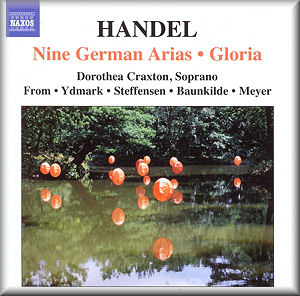 |
 |
|


alternatively
CD: MDT
AmazonUK
AmazonUS
Sound
Samples & Downloads |
George Frideric HANDEL
(1685-1759)
Nine German Arias, HWV 202-210 (1724-6) [48:36]
Gloria, HWV deest (1707) [17:16]
 Dorothea Craxton (soprano) Fredrik From (violin) Kjeld Lybeccker
Steffenson (cello) Leif Meyer (harpsichord, organ)
Dorothea Craxton (soprano) Fredrik From (violin) Kjeld Lybeccker
Steffenson (cello) Leif Meyer (harpsichord, organ)
Hanna Ydmark (violin: Gloria), Lars Baunkilde (violone: Gloria)
rec. 27 April-1 May 2010, Blågårds Kirke, Copenhagen,
Denmark
Notes in English, texts and translation not included but can be
downloaded from the Naxos site
 NAXOS 8.572587 [65:52]
NAXOS 8.572587 [65:52] 
|
|
|
Of all German composers, Handel must be the one who spent least
time in Germany and set the fewest German texts. A fair number
of those he did set were by Barthold Heinrich Brockes, whom
he probably met in Halle while still a teenager and whose passion
text he set in 1715/16. These nine expansive arias for soprano,
violin and continuo also use texts by Brockes and were written
between 1724 and 1726. They cover a considerable range of mood,
from joyful to introspective, and exploit the combination of
voice and violin - treated as equal partners - with much resource.
Though settings of German texts, the manner is Italianate, closer
to Vivaldi than to Bach. This consideration, though, derives
at least partly from the manner of the performances. Dorothea
Craxton has a lovely, light soprano voice, completely at ease
in her runs and ornaments, tastefully embellishing the “da
capo” sections. The instrumental contributions concentrate
on light textures and an avoidance of too much gravitas.
Time was when we thought Handel stood for nobility, loftiness
of thought, an uplifting effect on the listener and all sorts
of similarly dreadful things. I used to think of the first of
these arias as the epitome of the Handelian style as I believed
it to be. Here it goes like a pretty minuet, charming according
to its own lights. Probably this is what people expect Handel
to sound like these days. I don’t know if he didn’t
seem a greater composer when we thought all those unspeakable
things about him, but the delicate, rococo figure we know him
to be today has its charm.
Historically Informed Practice raises its ugliest head in nos.
6 and 7, where the chugging staccato quavers of the continuo
part are laid end-to-end with all the artistic beauty of railway
sleepers on a hundred-mile stretch of dead straight track. In
fairness, Craxton’s musicality can be appreciated even
over this opposition. Criticism is silenced by no. 4, where
an organ takes the place of the chattering harpsichord and time
stands still. It’s ravishingly lovely. No. 8 also uses
the organ to good effect, leaving one to wish it had been employed
in more than just three of the arias - maybe even in all of
them - and recorded with more presence. Criticism is disarmed
if not silenced by no. 9, where the organ is combined, in the
outer sections, by the cello playing pizzicato. I suspect this
is as close to Handelian practice as would be the use of a Steinway
piano, but its rococo, Watteau-like charm is enchanting to the
ear. And of course, you can argue that the use of a pizzicato
cello with an organ continuo was at least theoretically available
in Handel’s time, as the Steinway piano was not.
The Gloria was probably written in Italy in 1707. The cover
blurb describes it as having been “rediscovered”
in 2001. Actually, as Keith Anderson explains in his notes -
on which I have drawn in several parts of this review - it had
always been known, but had been supposed inauthentic. Now that
scholars have apparently decided it’s real Handel, it’s
had a lot of publicity and a good many performances. Funny,
when it was the same piece of music all along. Not the first
time, and assuredly not the last, that a piece of music has
been hailed as a wonderful discovery when it has an approved-composer
labelling, yet was deemed so much waste-paper when it was of
doubtful attribution or even anonymous. Since it’s a fine
piece one hopes it won’t sink from view again if questions
are raised once more about its authorship.
It doesn’t sound all that Handelian to my ears. If Handel
adopted an Italianate style in the German arias, here, on Italian
soil and with Latin words, he - or whoever - seems much more
German, especially if you mentally run the setting alongside
the familiar one by Vivaldi. “Dominus Deus”, for
example, has a Bachian profundity.
I suspect that the old-fashioned noble-lofty style of Handel
interpretation wouldn’t work here. Apart from a few jabbing
staccato chords I didn’t much care for, the music seems
a perfect fit for these performers’ concept of baroque
style.
I daresay my mumblings will be meaningless to most up-and-with-it
listeners today. Or are there isolated pockets of resistance
that wish the HIPsters had conserved the best of the old style
while freeing us from the worst? Not to speak of introducing
a few undesirable practices themselves. In the present case
HIP is at its best more often than at its worst and you will
in any case have Dorothea Craxton’s singing to enjoy.
She’s obviously one to watch.
I have stated in my header that the sung texts and translations
are not included and this is literally true. However, the texts
are short and Keith Anderson’s piece-by-piece discussion
actually tells you most of what you need to know. You can also
download the score from the IMSLP-Petrucci Library, though for
copyright reasons they have to offer an older edition without
the benefit of modern scholarship.
Christopher Howell
|
|












